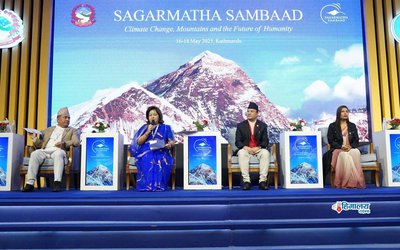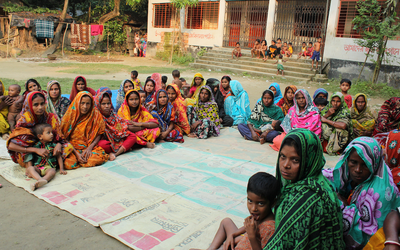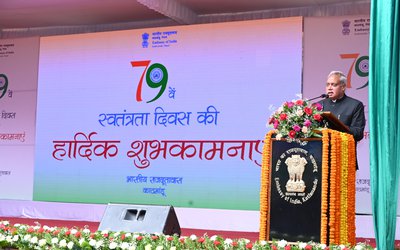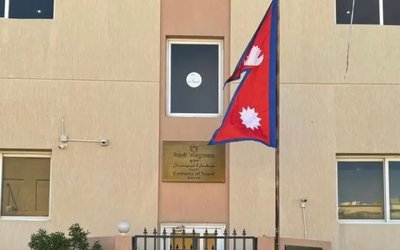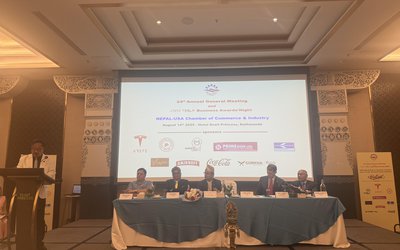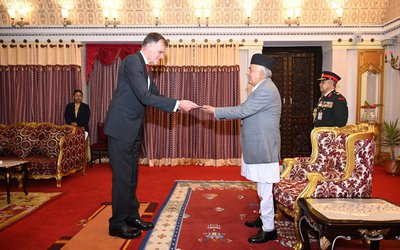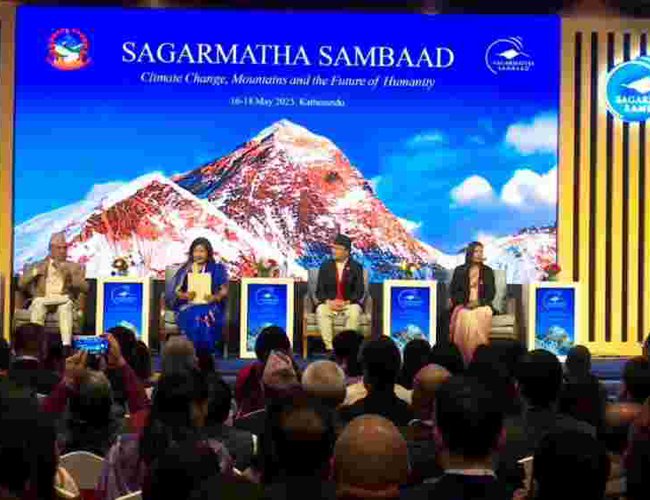
Conceived in 2019 and postponed the planned date of 2-4 April 2020 due to COVID-19, the government organised the first edition of the Sagarmatha Sambaad on "Climate Change, Mountains and the Future of Humanity" in Kathmandu from 16 to 19 May 2025, as announced by the Rt. Hon. Prime Minister on 21 January 2025 (start of the International Year of Glaciers (https://www.spotlightnepal.com/2025/03/27/sagarmatha-sambad-likely-bearing-fruits/) . This multi-stakeholder dialogue forumwas organised to: (i) generatemomentum for immediate climate action; (ii) advocate for climate justice with inclusive solutions; (iii) strengthen partnerships to accelerate climate finance, access technologies, and enhance capacity building; and (iv) reinforce global collaboration and cooperation for actions to preserve mountains and secure a sustainable future for humanity. The government issued the Sagarmatha Call for Action (SCA)on 18 May 2025, with 10 preambulatory and 25 operating paragraphs, as an outcome document of the Sambaad.
The SCA, inter alia, "reaffirms the urgency to hold the increase in the global average temperature to 1.50C above pre-industrial levels ...", calls for provision and mobilisation of financial support and establishment of a dedicated fund for mountain countries, urges to develop mechanisms for payment of mountain ecosystem services, and also "calls to initiate the creation of a multi-stakeholder international platform on mountain and climate change ..." etc. The SCA emphasises the need to develop knowledge centres, share best practices, and enhance the role of communities in climate policies, programmes and actions.
To come-up with the above outcome, ministers, advisors, ambassadors, and representatives from regional and international organisations delivered statements. Ministers from Bhutan, India, Japan, Nepal, UAE and Qatarand advisor from Bangladeshdelivered national statements in the plenary session. Over 12 keynote speakers and 48 panellists shared status, ideas, views, concerns, and the way forward through 12 parallel sessions under 5 themes namely beyond mountains: linking mountains to oceans;green economy; averting, minimising and addressing loss and damage; climate justice and the future of humanity; and global and regional partnership. Speakers at the high-level side-event, finance and roundtable discussion shared ideas, country initiatives and concerns for meaningful outcome from the Sambaad.
Representatives from institutions dedicated to the mountains and islands expressed the urgency of reducing GHGs emissions to keep temperature rise below 1.50C. Speakers urged, inter alia, for collective climate actions in sessions of: (i) urgency of 1.5-degree ambition for preservation of glaciers; (ii) connective highlands to islands; (iii) food security and climate resilient agriculture; (iv) community-led climate initiatives; (v) powering the future: harnessing clean energy: (vi) exploring nature, culture and adventure; (vii) mountain risk assessment and monitoring; (viii) addressing loss and damage; (ix) sustainable cities and communities; (x) building an inclusive future: gender and intergenerational equity; and (xi) bridging science and technology for mountain resilience; and (xii) sustaining mountain ecosystems.
Speakers called, inter alia, for: (i) maintaining 1.50C target and/or limiting global temperature rise; (ii) building resilience and adaptation capacity; (iii) urgency for global and regional cooperation for mobilising climate finance, technology transfer, and capacity building; (iv) developing common understanding between upstream and downstream communities on mountain and coastal ecosystems; (v) strengthen cooperation and advocacy and explore joint adaptation and resilience strategies, along with financial and policy pathways, to support both mountain and island communities. Speakers urged for promoting collaboration to develop climate-smart technologies; integrating climate adaptation and food security into policies; fostering multi-stakeholder partnership; advancing community-led adaptation initiatives, and utilising traditional knowledge, skills and values in designing context-specific adaptation strategies.
Furthermore, keynote speakers and panellists emphasised for: (i) harnessing clean energy, and promoting clean energy initiatives to avert climate change and its impact; (ii) adopting a mechanism to assessing mountains risk and conducting monitoring to enhance resilience to climate-induced disasters; (iii) a platform to discuss challenges, opportunities and innovations on disaster risk reductions; (iv) promoting actionable solutions to protect mountain communities; (v) identifying innovative solutions, and exploring ways to increase investments; (vi) exploring connections between climate change and urbanisations;(vii) identifying solutions to reduce climate vulnerabilities; (viii)advancing gender-responsive and youth-led climate initiatives; (ix) ensuring access to climate finance for vulnerable groups; (x) exploring nature-based tourism, forests and agriculture entrepreneurship; and (xi) identifyingopportunities for cooperation at different levels for climate actions in the mountains.
A high-level session on collaboration and cooperation beyond borders contributed to understand the state of air quality, increasing disasters, strengthening cooperation, and exploring opportunities to HKH's voice at the global forums. A separate session on 'unlocking youth potential in science, technology and innovation' realised the urgency for youth actions and innovation to drive community-level climate solutions.
A 'multi-stakeholder roundtable' collected opinions to recognise, respect and reward ecosystem services; reduce climate-induced disaster risk and enhance resilience; and promote innovative climate and carbon financing. A session on 'addressing triple planetary crisis: air pollution, biodiversity loss and climate change' enhanced understanding on the current state of air quality and impact on mountain communities, enablers and barriers to control air pollution, and actionable recommendations and pathways to strengthen regional cooperation and investments. A session on 'financial challenges to climate justice action and sustainable development' approached on cross-sectoral goals for justice in climate finance and sustainable development, to evaluate current frameworks, identify key areas and methods for interventions and collaborations, and foster collaboration across governments and institutions.
The Sagarmatha Sambaad was opened and addressed by the Rt. Hon. Prime Minister of Nepal on 16 May 2025. Welcoming the delegates, Hon. Minister for Foreign Affairs informed climate crisis and its long-lasting impacts in the mountain communities and resources. TheCoP29 Presidency (Azerbaijan) informed key decisions on mountains, and called for mobilising climate finance. The Hon. Minister for Environment, Forest and Climate Change of the Government of India, and Vice-chair of the Standing Committee of the 14th National People Congress of the People's Republic of China delivered statements along with the video message from the Secretary-General of the United Nations during the opening session.
The Prime Minister unveiled Nepal's third Nationally Determined Contribution (NDC3.0) and handed over it to the CoP29 Presidency.
The Office of the Prime Minister and Council of Ministers (OPMCM), Ministry of Foreign Affairs and the Ministry of Forests and Environment - climate change focal point - were engaged in organising this Sambaad. To ensure the Sambaad successful and meaningful, the government constituted 13-member Steering Committee under the chair of the Prime Minister, and 12-member Management Committee under the chair of the Minister for Foreign Affairs along with 10-member Secretariat under the chair of the Secretary of OPMCM, including 5-member Media Committee, and 13-member Working Team (https://sagarmathasambaad.org/). Furthermore, Prime Minister, 3 Ministers, Chief Secretary and 3 other Secretaries invited for participation from the second-week of May through separate video messages.
I attended this event as an Expert Member of nearly4-decade old Nepal Forum of Environmental Journalists (NEFEJ), dedicated to raising public awareness, and lobbing and advocacy for environment-friendly public policies. Previous climate change focal persons, negotiators, and chair of the LDC Coordination Group from Nepal for 2013-'14 period were not seen in the Sambaad.
Kathmandu hosted two mega-conferences on climate change and the mountains during the last 15 years.The then Ministry of Environment organised an 'International Conference of Mountain Countries on Climate Change' in Kathmandu on 5-6 April 2012 with support from development partners. The 2012 Conference was organised in response to the call of the then Prime Minister upon the mountain countries "to come together, form a common platform and collectively raise concerns in the international arena" during the Copenhagen Climate Conference in 2009. Nepal started the 'Mountain Initiatives'also after the first-hand experience of the cabinet ministers about the impacts of climate change on the mountains during the high-altitude meeting of the Council of Ministers at Kalapatthar on 4 December 2009.
Rt. Hon. President of Nepal inaugurated the 2012 Conference. Ministers from Bhutan, Georgia, Mongolia, Nepal, Peru, Qatar, Tajikistan, Tanzania, and Yemen delivered statements, including from theIPCC chair with a message from the Executive Secretary of the UNFCCC and Mr. Appa Sherpa (21-times Mount Everest Summiteer). Members of Parliament from Bangladesh and Sri Lanka, Senate Member from Pakistan, Ambassador from Chile, high-level dignitaries from Azerbaijan, Bolivia, China, Congo, India, Japan, Kyrgyzstan, Myanmar, USA and Uzbekistan, and senior officials from UNEP,World Bank and the Asian Development Bank etc shared perspectives as keynote speakers and the panellists.
The Prime Minister, former Prime Minister, Deputy Prime Minister(s) and Ministers from Nepal also addressed different sessions. During this Conference, Nepal launched the Climate Change Support Programme (NCCSP) and the National Framework on LAPA (2011). The NCCSP was Nepal's first adaptation project as prioritised in 2010 NAPAand was implemented with support from the UK government using LAPA framework to localise adaptation options in climate vulnerable districts of mid-and far west Nepal.
The Conference participants adopted the 10-points 'Kathmandu Call for Action' (KCA). During the closing session, Hon. Ministers from Tanzania, Tajikistan, Peru, and Bhutan and representative of the Swiss Embassy expressed KCAthe beginning of collective actions and tool for negotiation process. The KCA urged, inter alia, for promoting collective actions and research to find best solutions, sharing traditional knowledge and best practices, updating sustainable mountain agenda, building incentive mechanisms to recognise and reward mountain communities for conserving mountain ecosystem services, strengthening Mountain Initiative as a global platform, establishing a dedicated funding arrangements for adaptation and mitigation programmes in the mountain countries.
These two Calls (SCA and KCA), the outcome of the understanding and realisation of the mountain countries, may guide to move ahead through collaboration, cooperation, continuity, commitments, and funding arrangements. Nepal lacks positive experience on continuity of 'country initiatives and ownership'. National agenda and initiatives are normally'politicalised', facing difficulty to 'ownership' on initiatives of the previous government.
Impact of climate change in the mountains and glaciers is realised at the political, functional and management levels.Climate-induced disasters have increased in the recent years. Science is clear but collective climate actions are required. Scientists may need support for generating and documenting evidence. There is a need for establishing a 'trust' amongst political parties and have a common voice at the international level. Let us hope that SCA, KCA and other 'initiatives' may provide Nepal additional opportunities to lead future processes on climate change and the mountains.

Batu Uprety
Former Joint-Secretary and Chief of Climate Change Management Division, Ministry of Environment (then), and former Team Leader, National Adaptation Plan (NAP) formulation process. E-mail: upretybk@gmail.com
- NDC3IP Formulation Process Launched
- Aug 10, 2025
- Understanding the Supplementary EIA
- Jul 27, 2025
- Approval Of EIA-Related First And Last Reports At Once
- Jun 14, 2025
- Teaming up Climate Change Negotiation
- Apr 18, 2025
- Sagarmatha Sambad: Likely Bearing the Fruits
- Mar 27, 2025

